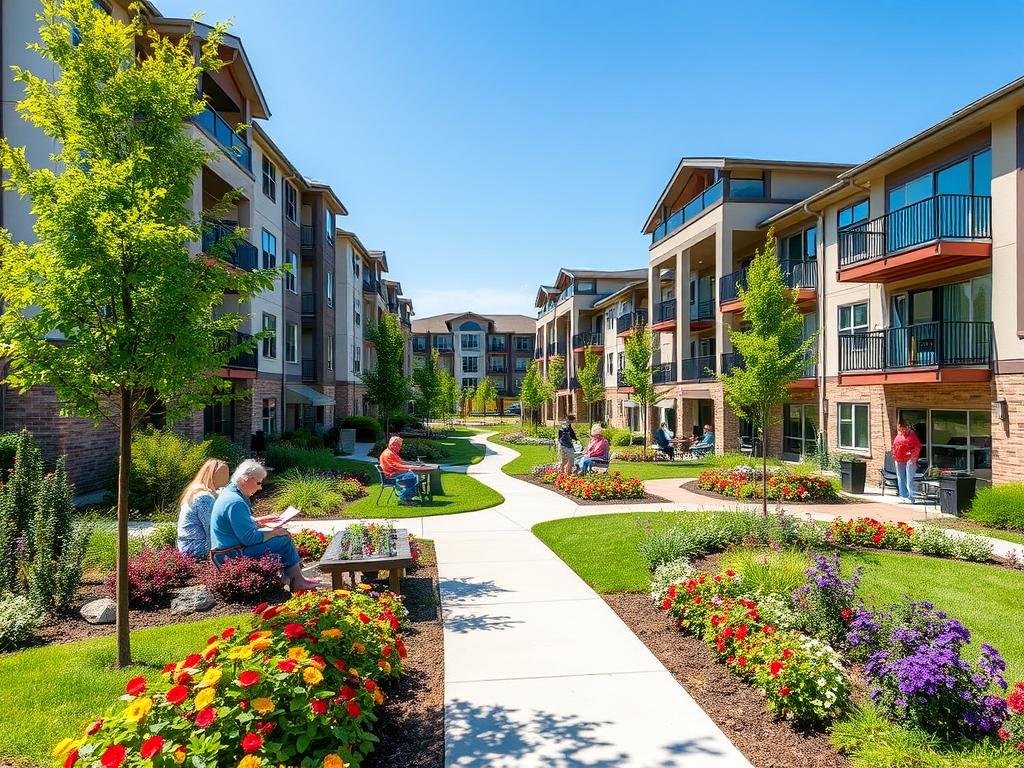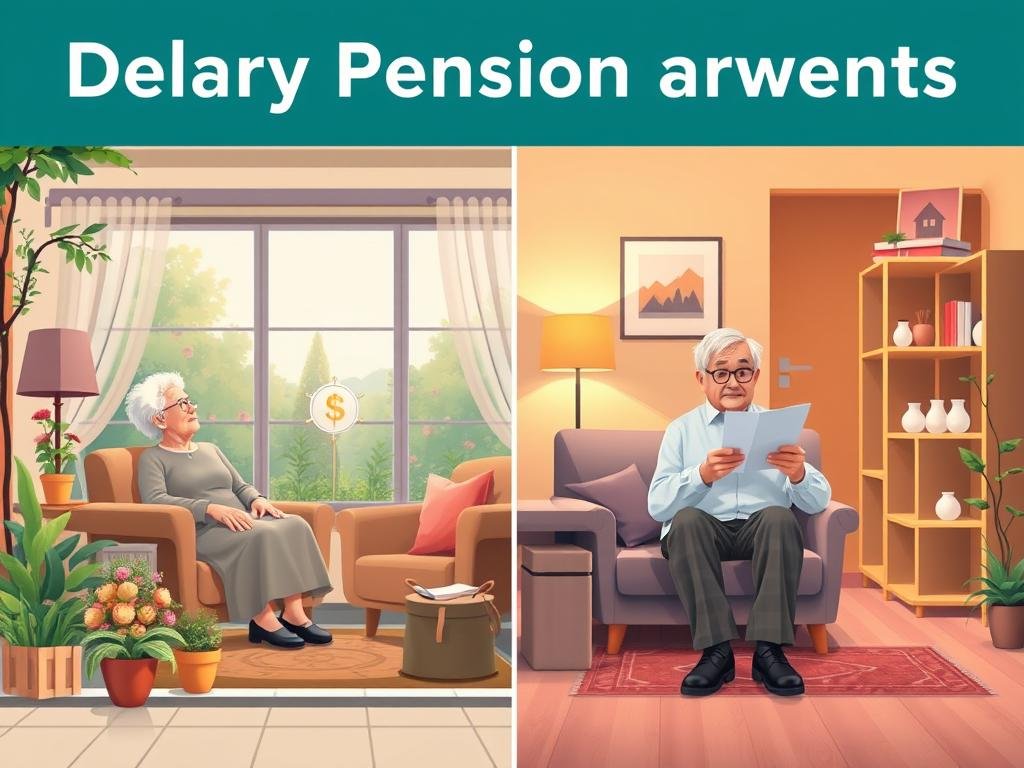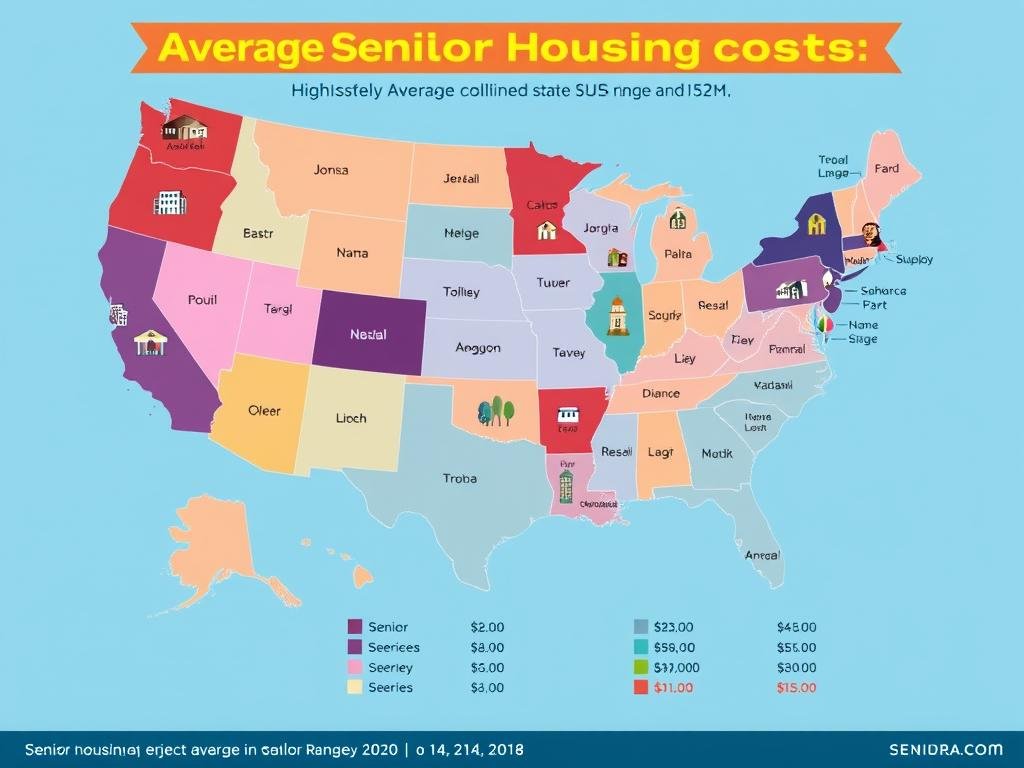Did you know a small inflation rate of 3% can seriously decrease your money’s value, especially if your income only goes up by 1%? When getting ready for retirement, it’s key to boost your pension income. This helps keep senior housing affordable as prices go up. This guide will show you how to manage your pension well. You’ll learn tricks to enjoy your retirement without worrying about money. Plus, we will cover how certain strategies, tips, and government aids can make affordable senior housing solutions possible.
Key Takeaways
- Understanding the impact of inflation on pension income and purchasing power.
- Strategies to enhance your pension income through diversified investments.
- Exploring various housing options for seniors with varied income levels.
- The critical role of government assistance programs in reducing housing costs.
- Assessing and planning for long-term care needs to ensure sustainability.
Understanding Pension Income and Its Importance
As you near retirement, knowing about pension income is key for your financial planning and where you’ll live as a senior. But what is pension income? It’s the money you get regularly after retiring. This money comes from funds added by you or your employer during your work years. Having this money is important for choosing how you live after you stop working.
Knowing the different pension plans is important too. Some are defined benefit plans, where you get a set amount each month. This amount is based on your pay and how long you worked. Then, there are defined contribution plans like 401(k)s. Here, both you and your employer put in money. The amount you get depends on how these investments do.
Learning about what is pension income makes you smart about money for your future. Knowing where your pension money comes from helps you plan better for retirement. This planning is crucial for picking a good place to live that you can afford.
With more people getting older and needing more care, understanding your pension is more important. It’s not just about getting by in retirement. It’s about having a good life. Good planning with pension income can reduce worry. It makes sure your money meets your needs and dreams for living well.
Assessing Your Current Financial Situation
Checking your finances now is key for a good retirement. You look at money from jobs, savings, Social Security, and side jobs. This helps plan your future. Knowing what you’ll have lets you fix any problems to cover future costs.
Making a budget is crucial. It includes everyday costs, healthcare, and surprise bills. Knowing where your money goes helps you decide wisely. For example, if living costs go up by 3% each year, but CDs only grow 2%, you lose money over time.
Looking into different ways to make money that keep up with rising costs is smart. Stocks that pay dividends like utility or consumer goods companies can grow over time. This might beat inflation. TIPS and earning money from Airbnb can change with the market, protecting you from high costs. Checking your money sources keeps your retirement safe from money worries.

| Income Source | Annual Return | Inflation Impact |
|---|---|---|
| CDs | 2% | Negative real returns |
| High-Yield Savings | 1.5% | Net loss in value |
| Dividend Stocks | Variable | Potentially match/increase with inflation |
| TIPS | Variable | Grows with inflation |
| Airbnb Properties | Variable | Adjusts to market demand |
Because of this, it’s crucial to have different ways to make money that can handle economic changes. A varied money plan gives you security. It helps with now and future financial needs.
Exploring Housing Options for Seniors
It’s important to know the different places seniors can live, based on their money, way of life, and health needs. Independent Living Communities are great for those who want to keep their freedom. These places have group activities and features to enjoy.
Assisted Living Facilities are good for those who need extra help every day. They help with personal care tasks and managing medicines. They also offer medical help on site, which can make families feel more at ease about their older family members.
“There’s nothing like feeling independent while having a supportive community around you. Many seniors find that their quality of life improves significantly when moving to an Independent Living Community,” says Sarah Fischer, Senior Living Advisor.
Age-restricted communities are for people 55 years old and up. They provide privacy, chances to make friends, and easy access to fun activities. These places are perfect for active seniors who enjoy being around others.

Choosing the right senior living option can be hard. Think about your health, how you want to live, and your budget. The goal is to find a place where you can be independent, get the care you need, and have a supportive community. This will help you enjoy your later years to the fullest.
The Role of Government Assistance Programs
Government help is key for seniors in handling their housing and healthcare bills. Social Security Benefits and Supplemental Security Income (SSI) add to pensions, easing money worries for many.
About 27% of seniors depend on these programs for affordable housing. Yet, 36% who could get help don’t sign up, making their financial stress worse. Joining these programs cuts down out-of-pocket costs for those with small pensions. Sadly, 48% of elders say their pension doesn’t fully cover housing.

Medicaid and Medicare give important aid too. Medicaid covers medical expenses for low-income folks. This support helps make healthcare affordable. Medicare helps by paying for many medical costs. This makes it less hard to handle aging-related expenses. But, only 15% of seniors get extra money help from state programs.
Many seniors, 62%, spend too much of their income on housing, causing stress. More seniors are seeking government housing help, with a 20% application jump last year. Also, half of U.S. counties don’t have enough affordable places for seniors. This makes finding help harder.
It’s good to use financial counseling from these programs. Yet, only a third of seniors do it. Counseling can help them use their pension better and make smart money choices.
These help programs are crucial for covering living costs with a pension. The average senior’s monthly pension is around $1,500. This is much less than the $3,000 monthly living cost in cities. With these programs, housing stays within reach.
Strategies to Enhance Your Pension Income
As you plan for retirement, strategies to enhance your pension income are key to financial security. Consider the benefits and downsides of delaying pension payments carefully.

Waiting to start pension payments can mean more money each month. However, it’s not the right choice for everyone. Here’s why:
| Pros | Cons |
|---|---|
| Increased monthly pension payments | Needs financial security during wait |
| Better financial support in the long run | Life expectancy is unpredictable |
| Possible tax benefits | Access to funds comes later |
Another way to boost your pension is by looking into part-time jobs. Many retirees enjoy how these jobs add to their income while keeping them active and involved. Check out these popular part-time jobs:
- Consulting: Share your expertise and advice.
- Freelancing: Offer your writing or design skills on your own schedule.
- Retail: Work in a local shop, often with flexible hours.
Evaluating each strategy’s pros and cons helps you pick the best option. Talk to a financial planner to figure out how to increase your pension without hurting your retirement life. Smart financial planning leads to a more secure and enjoyable retirement.
Understanding the Cost of Senior Housing
When looking into senior housing, it’s key to grasp the different aspects that affect cost. Things like where you live, what perks you get, and the care levels matter. The prices can vary a lot in different states. This makes it vital to plan according to your budget.

The cost of living in various states plays a big role in housing costs. For example, senior housing costs more in California than in Texas or Florida. To help, here’s a list with average monthly costs for senior housing in several states:
| State | Average Monthly Cost |
|---|---|
| California | $4,500 |
| Florida | $3,000 |
| Texas | $3,200 |
| New York | $4,800 |
| Ohio | $3,700 |
The type of senior housing you choose impacts costs too. Options like independent living usually cost less than assisted living or nursing homes.
Inflation is another important factor to think about. An inflation rate of 3% a year can lessen how much you can buy if your income doesn’t increase. Earning through CDs might not beat the inflation rate, which means you could end up losing money in real terms.
But, there are investments that can fight against inflation. TIPS and REITs can adjust income to keep up with inflation. Putting money in dividend-paying stocks, especially in stable sectors, can also help. These stocks often grow their payouts, helping you handle inflation better.
To sum up, getting a handle on senior housing costs and using smart investments against inflation can greatly help. By understanding prices in various states and other key factors, you can make wise choices for a good retirement life.
Tips for Choosing Affordable Senior Housing
Finding the right senior housing can seem tough. Yet, some smart tips can guide you to a wise choice. Location Considerations are key. They help figure out both cost and life quality. Choose areas where living is cheaper but also safe and close to needed services.
Look at the amenities and services for the best deal. Aim for places with good public transport, close healthcare, and senior fun activities. It’s vital to check if the amenities give good value for your money.
Below is a comparison of affordable senior housing options from different communities:
| Community | Key Amenities | Average Monthly Cost |
|---|---|---|
| The Greenfield Residences | Public transport access, healthcare facilities nearby, wellness centers | $2,500 |
| Sunset Retirement Village | Proximity to hospitals, outdoor recreational parks, fitness centers | $3,000 |
| Sunny Acres Senior Living | Accessible transport, community engagement programs, in-house healthcare | $2,800 |
| Heritage Gardens Assisted Living | On-site healthcare, transport services, social activities | $3,200 |
Make sure your choice matches personal likes and the need for support. Talk to the people living there and look around the place yourself. Knowing what daily life there is like helps. Always go through the contract details and ask about extra costs for clear cost understanding.
To sum up, choosing senior housing means weighing Location Considerations against your budget. And making sure you get the right amenities and services for your needs. This way, you’ll find a cozy and affordable spot for a happy retirement.
Leveraging Home Equity for Senior Housing
As retirement gets closer, knowing how to use your home’s equity is key. A Home Equity Line of Credit (HELOC) is a great way to fund senior housing. With a HELOC, you can borrow against your home’s value. You get flexible access to money when you need it. This can help with unexpected costs or add to your pension.
Seniors also turn to reverse mortgages. This option lets you turn equity into cash without paying back monthly. It’s helpful if you have small retirement savings or want no mortgage payments. Yet, knowing the good and bad of each choice is vital.
- Flexibility: HELOCs are like credit cards. You can borrow and repay as needed. Reverse mortgages give a lump sum or monthly cash, removing monthly paybacks.
- Interest Rates: HELOCs have changing rates. Reverse mortgages might have higher fees and rates but offer steady cash.
- Eligibility: Both need you to have enough home equity. But only those 62 and older can get reverse mortgages.
| Criteria | HELOC | Reverse Mortgage |
|---|---|---|
| Age Requirement | None | 62 or older |
| Repayment | Monthly payments | No monthly payments |
| Interest Rate | Variable | Fixed or adjustable |
| Loan Amount | Draw as needed | Lump sum or monthly payments |
| Closing Costs | Lower | Higher |
Looking closely at both HELOC and reverse mortgage can show the best path for your money and home needs. It’s smart to talk with a financial advisor. They can help you use your home equity to better your retirement living.
Finding Financial Assistance Programs
When looking for extra money for senior housing, there are many financial assistance programs available. These programs get support from Local Nonprofits and Resources. They aim to lower housing costs for seniors. By looking into these options, you can find the best one for your housing needs now and later.
Seniors have many grants and subsidies they can use. Each one has different benefits:
- The U.S. Department of Housing and Urban Development (HUD) offers special housing programs for low-income seniors. These help to lower rent each month.
- Groups like the National Council on Aging offer financial help and resources. They focus on senior housing and care needs.
- Local community action agencies help seniors get grants and subsidies. They support both immediate and future financial needs.
Knowing how to find these Local Nonprofits and Resources is key. It helps you plan your finances better. Here is a guide to start:
| Organization | Service | Contact Information |
|---|---|---|
| U.S. Department of Housing and Urban Development | Subsidized Housing Programs | Washington, DC office (202) 708-1112 |
| National Council on Aging | Financial Assistance Resources | Arlington, VA office (571) 527-3900 |
| Local Community Action Agencies | Grants and Subsidies Application Assistance | Contact local offices for specific information |
To apply for these programs, you need to fill out forms and give details about your money and housing. The process can be hard, but help is available. Local Nonprofits and Resources can guide you. Make sure to keep your applications updated with any new info.
Using financial assistance programs can make senior housing costs lower. It helps ensure a nice place to live during your later years.
Planning for Long-Term Care Needs
When planning for long-term care, it’s key to think about future health issues and their financial effects. Long-Term Care Insurance is crucial for protecting your money and ensuring you get needed care without a big financial burden.
Getting long-term care insurance helps protect your estate from big medical bills. It’s smart to look at different insurance plans to find the best one for you.
It’s important to plan for future health costs. Knowing these costs helps you set money aside, so you’re ready for any surprise medical expenses. Think about these factors when making your budget:
- Type of Care: Decide if you need care at home, assisted living, or a nursing home.
- Duration of Care: Guess how long you might need care.
- Inflation Rate: Remember, healthcare costs usually go up by 3% each year.
Learn about different financial tools like Treasury Inflation-Protected Securities (TIPS) and Real Estate Investment Trusts (REITs). These tools can help your income keep up with rising costs. They’re good for keeping your buying power steady.
“Planning for long-term care needs isn’t just about protecting your health, it’s about protecting your financial future,” says financial expert Suze Orman.
Here’s a quick look at the expected costs for different types of long-term care:
| Type of Care | Estimated Monthly Cost (2023) |
|---|---|
| In-Home Care | $4,600 |
| Assisted Living | $4,300 |
| Nursing Home (Semi-Private Room) | $7,900 |
| Nursing Home (Private Room) | $9,000 |
Understanding Long-Term Care Insurance means you’re prepared for these costs, giving peace of mind to you and your family. Planning ahead lets you build a solid financial plan. This plan will cover expected and surprise health care costs, helping to keep you cared for and financially secure as you get older.
The Importance of Community and Social Engagement
As we get older, having an active social life is key to our well-being. Being socially active boosts both our mental and physical health. It helps our brains stay sharp, makes us feel less lonely, and increases our happiness.
There are lots of resources and programs available to help keep you connected. You can find these at local senior centers, community centers, and libraries. They offer things like hobby groups, fitness classes, cultural events, and workshops. Being a part of these activities is fun and makes you feel like you belong.
Here are some great community programs for older adults you might like:
- Senior Recreation Centers: They offer various activities such as exercise, arts and crafts, and game nights.
- Local Libraries: You can join book clubs, tech classes, and talks designed with seniors in mind.
- Volunteer Opportunities: Volunteering gives you a feeling of achievement while you help your community.
- Church Groups: Many churches have social events and support groups for older adults.
Being socially active does more than make you happy. Research shows that seniors who are socially active are less depressed and have a slower rate of brain aging. Plus, being part of a community gives you support when you need it.
If it’s hard for you to get around, try online classes and meet-ups on platforms like Zoom. Many community websites list virtual events you can join from home. This way, you can stay connected without leaving your house.
Being socially engaged isn’t just about avoiding loneliness. It’s about making your life richer and living it to the fullest. So, go out there, find what you love, and be part of the warm, welcoming community around you.
Creating a Sustainable Retirement Budget
Creating a sustainable retirement budget is key for your financial health and happy life after work. It’s important to balance your money coming in and going out. Especially as you face different challenges. A big part of your income may be Social Security benefits. In 2023, for 21% of retired couples in the United States, it made up 90% of their income. Planning well is crucial because of this fixed income.
When making your retirement budget, remember to think about regular and surprise costs. Thanks to social insurance programs, fewer than 9 out of 100 people over 65 are poor. But, living costs, like healthcare, are going up. In 2023, Medicare used 15% of the federal budget, or $760 billion. This shows how important it is to include healthcare in your budget plan. Also, unexpected expenses like health issues or home changes might come up.
A survey in Howard County showed about 25% worry about paying for basics like rent or food. This shows the need to plan for food and housing in your retirement budget. Over 62 million Americans got Social Security benefits in 2023. By adding this to savings and investments, you can make a budget that works for your retirement. Adjusting your budget when things change is crucial for keeping a good life quality.
FAQ
What is pension income?
Why is understanding pension income important for senior housing affordability?
What are the different income sources to evaluate besides pensions?
What are the available housing options for seniors?
What government assistance programs can help seniors manage housing costs?
How can I potentially increase my pension income?
What are the average costs of senior housing across the United States?
What are some tips for choosing affordable senior housing?
How can I use home equity to fund my senior housing needs?
How do I find financial assistance programs for senior housing?
What should I consider when planning for long-term care needs?
Why is social engagement important for seniors?
How can I create a sustainable retirement budget?
Source Links
- 3 Passive Income Streams That Are Vulnerable to Inflation
- Donoghue Forlines LLC Makes New $2.13 Million Investment in The Kroger Co. (NYSE:KR)
- Are you suffering from money dysmorphia? Here are the signs.
- Prepare now: Europe must get ready for the coming long-term care surge
- Planning To Buy a House in 2025? Suze Orman Says You Need 3 Things Lined Up First
- 7 Most Expensive Homes Sold in 2024
- Smart Money Podcast — 2025 Real Estate Trends: What Homebuyers and Sellers Need to Know – NerdWallet
- Ventura County sizes up homeless population with annual count
- £100,000 on report calling for £15 charge to drive in cities
- Lakeville horseback riding center owner seeks to boost rider confidence
- The £25,000 Pension Gap: Why UK Retirees Need to Plan Ahead in 2025
- 7 Financial Habits That Could Cost You Thousands Every Year
- Walmart will pay more than $600,000 a year to some top managers
- Poll Shows Pennsylvanians Demand a New Path Forward from State and Federal Elected Officials
- Tamil Nadu pitches for more R&D and advanced manufacturing in the state
- Indian companies better placed despite the rupee fall: Moody’s
- Premium brands, new markets to lift AABL’s spirits high
- Social Insurance Statistics 2025: Coverage, Benefits, etc. • CoinLaw
- Comerica Incorporated (NYSE:CMA) Q4 2024 Earnings Call Transcript
- Health Department and Local Health Improvement Coalition to Launch Food Council to Combat Food Insecurity
